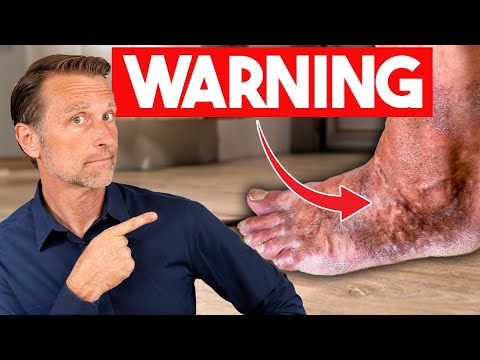Did you know that foot health can be a key indicator of underlying health problems? Learn what your feet can tell you about your health. In this video, we’ll review some common disease warning signs that show up as foot symptoms.
0:00 Introduction: Disease warning signs in your feet
0:50 Peripheral neuropathy
1:59 Foot turns blue/Toes turn blue
3:04 Foot cramps
3:51 Swollen feet
4:09 Discoloration of lower legs
4:57 Big toe pain (gout)
5:27 Other feet symptoms of disease
Today, we’re going to discuss the connection between your feet and health. The foot receives oxygen and nutrition from the heart through tiny capillaries. The following feet symptoms are also potential signs of diseases.
1. Peripheral neuropathy
This shows up as numbness or burning in the feet due to low vitamin B1 (thiamine). Benfotiamine, a fat-soluble form of vitamin B1, may help.
2. Fingers or toes turn blue
This can be related to an overactive sympathetic nervous system. This is often treated medically with calcium channel blockers. Magnesium is a natural calcium channel blocker and the primary regulator of calcium inside the cells. Magnesium glycinate is the most absorbable form of magnesium.
3. Foot cramps
Foot cramps and charlie horses in the calves are among the earliest signs of magnesium deficiency. Try taking 400 to 800 mg of magnesium glycinate for several weeks to alleviate foot cramps.
4. Swollen feet
Swelling of feet typically involves diabetes and excess sugar in the blood, which causes sodium and water retention. The solution is to remove sugar from the diet.
5. Discoloration of lower legs and feet
This is often caused by a circulation problem. Deep vein thrombosis is a condition where you develop clots in the veins of the lower legs. This can cause fluid retention and discoloration of the lower legs and feet.
6. Big toe pain
Pain in the big toe is usually a symptom of gout caused by too much uric acid. Decreasing oxalates in the diet can sometimes solve this problem. Magnesium can also help decrease oxalates.
Ulcers on the foot can be caused by diabetes. Benfotiamine and a low-carb diet can help mitigate a diabetic or high blood sugar problem.
Fungus or jaundice can cause discoloration around the nail bed. Splitting or curving toenails indicate nutritional deficiencies.
Dr. Eric Berg DC Bio:
Dr. Berg, age 59, is a chiropractor who specializes in Healthy Ketosis & Intermittent Fasting. He is the author of the best-selling book The Healthy Keto Plan, and is the Director of Dr. Berg Nutritionals. He no longer practices, but focuses on health education through social media.
Follow Me On Social Media:
Facebook: https://bit.ly/FB-DrBerg
Instagram: https://bit.ly/IG-DrBerg
Listen to my Podcast: https://bit.ly/drberg-podcast
TikTok: https://bit.ly/TikTok-DrBerg
Disclaimer:
Dr. Eric Berg received his Doctor of Chiropractic degree from Palmer College of Chiropractic in 1988. His use of “doctor” or “Dr.” in relation to himself solely refers to that degree. Dr. Berg is a licensed chiropractor in Virginia, California, and Louisiana, but he no longer practices chiropractic in any state and does not see patients, so he can focus on educating people as a full-time activity, yet he maintains an active license. This video is for general informational purposes only. It should not be used to self-diagnose, and it is not a substitute for a medical exam, cure, treatment, diagnosis, prescription, or recommendation. It does not create a doctor-patient relationship between Dr. Berg and you. You should not make any change in your health regimen or diet before first consulting a physician and obtaining a medical exam, diagnosis, and recommendation. Always seek the advice of a physician or other qualified health provider with any questions you may have regarding a medical condition.
#keto #ketodiet #weightloss #ketolifestyle
Thanks for watching! I hope this increases your awareness about the connection between your feet and health. I’ll see you in the next video.



